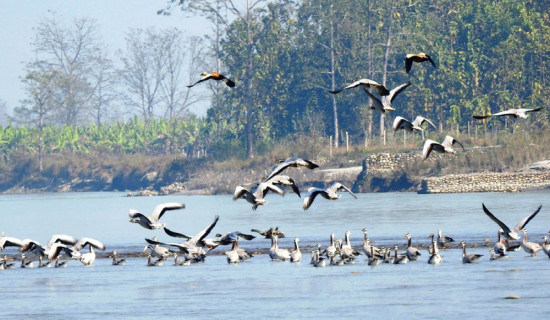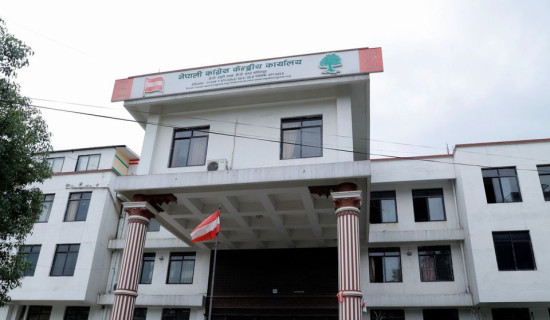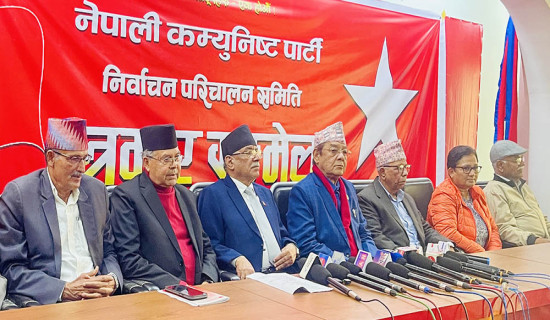- Friday, 27 February 2026
Strengthen CIAA To Curb Corruption
It is an indisputable fact that corruption is the abuse of assigned power and authority for making private gains. Taking or offering bribes, embezzling public funds and influencing officials are some of the activities associated with corruption. This form of irregularity deteriorates public trust, weakens governance, aggravates inequality, deprivation and causes social disunion ecological mess. Corruption takes a toll on society in many ways. So, corruption is regarded as the biggest obstacle to socio-economic development of nations globally.
As this social anomaly obstructs the process of economic growth by increasing income inequalities and poverty, it has proven to be detrimental to nations, especially low-income ones. When these countries are in the grip of corruption, their governance mechanisms become so weak that they cannot function well. Policymakers and public servants start begin taking money or other favours in exchange for services. This leads to disruptions of the entire service delivery system. The morale of those promoting irregularities remains very high and the organised criminal groups may become strong enough to commit many different financial as well as other offenses.
High ranking
Nepal ranks at 117th in the Transparency International's 2021 Corruption Perceptions Index (CPI). The country got 33 points for corruption last year. It had ranked the same in 2020 as well. This indicates that the country has failed to make any headway when it comes to reducing the level of corruption. CPI ranks 180 nations globally in terms of the degree of perceived corruption in the public sector. The ranking is done in such a way that the nation whose public sector is supposed to the most honest ranks first.
What is quite upsetting is that corruption has been rampant in Nepal, too, even after the adoption of the federal democratic system of governance. This incongruity is reported to have been prevalent in all sectors ranging from the public offices, judiciary and security agencies. Even the local governments, which work very closely with the people, are also not free from corruption. It is ironic that the local levels have become fertile grounds for corruption as irregularities have reached there together with the delegation of powers and authority.
With the implementation of federalism, the local levels have been entrusted with additional responsibilities of mobilising resources for education, health and other development activities. The local governments can carry out legislative, executive and semi-judicial roles. Their jurisdiction is so extensive that they can carry out as many as 22 functions. The Constitution of Nepal, 2015 has widened the authority of the local levels based on the idea of taking the ‘Singha Durbar’ to all the villages nationwide. This is really a good concept as it empowers the local government institutions to carry out the social, economic and other development activities independently. These institutions, however, have to work in close cooperation and collaboration with the federal and provincial governments.
But with the devolution of powers to the local levels, more corrupt practices have been reported there. According to the 32nd annual report of the Commission for the Investigation of Abuse of Authority (CIAA), the Ministry of Federal Affairs and General Administration has topped others in terms of corruption-related complaints. In the fiscal year 2078/79 B.S., as many as 8,064 cases of irregularity that were registered with the anti-corruption body were associated with the same ministry and offices under it. This figure accounts for 33 per cent of the total number of grievances. In the last fiscal year, the CIAA received a total of 16,238 complaints from across the nation through different mediums.
The anti-corruption watchdog’s fresh report indicates that the nation’s education sector was second in terms of corruption-related complaints after the Ministry of Federal Affairs and General Administration. The CIAA got a total of 3,725 charges. This accounts for 15 per cent. The figure of complaints related to the land administration was 7.7 per cent of the total charges registered in the last fiscal year. Looking at the charges received province-wise, Madhes Province was ahead of others, with 24.75 per cent of the total complaints filed with the CIAA. The number of charges it received form Bagmati, Lumbini, Province 1, Sudurpaschim, Karnali and Gandaki stood at 24.13 per cent), 14 per cent, 11.61 per cent, 10.20 per cent, 8.18 per cent and 7.62 per cent, respectively.
The CIAA files cases against individuals alleged to have been involved in the abuse of authority. But the number of verdicts issued by the Special Court in favour of the anti-corruption body has been going down. According to the CIAA, over 88 per cent of court verdicts were in favour of it in the fiscal year 2075/76 B.S. However, the number of such verdicts dropped to just 38.51 per cent in 2078/79 B.S. Only 57 verdicts out of 148 were in favour of the CIAA in the last year fiscal year. This was the lowest figure of unfavourable verdicts in the past 13 years.
Such a situation has emerged after the issuance of the Supreme Court’s decision to stop the CIAA from conducting its ‘string operations’. This verdict was issued in April 2021. Prior to that, the CIAA used to arrest public officials red-handed while receiving bribes. Under that tactics, the anti-grant body used to provide money to its staffers, accusers or others to trap bribe-seeking officials. But the court’s decision has invalidated Rule 30 of the CIAA Rules.
Notorious scams
In view of growing irregularities in the country, the government and other responsible stakeholders must strengthen the CIAA to tackle them in a more effective manner. It is annoying that many notorious scandals incurring a huge loss to the nation such as the Lauda Air scam, wide-body aircraft purchase scam and Lalita Niwas land grab scam have yet to be investigated properly. Corruption is sure to keep thriving in the country if those involved in such scams are not brought to justice. Arresting only junior civil servants won’t be enough to control corruption.
(Dahal is a deputy executive editor of this daily.)
















